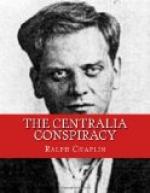Defense Attorney Vanderveer offered to prove to the court that such was the case. He offered to prove this was a part of the greater conspiracy against the union loggers and their hall,—offered to prove it point by point from the very beginning. Incidentally Vanderveer offered to prove that Earl Craft, electrician in charge of the city lighting plant, had left the station at seven o’clock on Armistice day after securely locking the door; and that while Craft was away the lights of the city were turned off and Wesley Everest taken out and lynched. Furthermore, he offered to prove that when Craft returned, the lights were again turned on and the city electrician, his assistant and the Mayor of Centralia were in the building with the door again locked.
These offers were received by his honor with impassive judicial dignity, but the faces of the lumber trust attorneys were wreathed with smiles at the audacity of the suggestion. The corporation lawyers very politely registered their objections which the judge as politely sustained.
The Night of Horrors
After Everest had been taken away the jail became a nightmare—as full of horrors as a madman’s dream. The mob howled around the walls until late in the night. Inside, a lumber trust lawyer and his official assistants were administering the “third degree” to the arrested loggers, to make them “confess.” One at a time the men were taken to the torture chamber, and so terrible was the ordeal of this American Inquisition that some were almost broken—body and soul. Loren Roberts had the light in his brain snuffed out. Today he is a shuffling wreck. He is not interested in things any more. He is always looking around with horror-wide eyes, talking of “voices” and “wires” that no one but himself knows anything about. There is no telling what they did to the boy, but he signed the “confession.” Its most incriminating statement must have contained too much truth for the prosecution. It was never used in court.
When interviewed by Frank Walklin of the Seattle Union Record the loggers told the story in their own way:
“I have heard tales of cruelty,” said James McInerney, “but I believe what we boys went through on those nights can never be equaled. I thought it was my last night on earth and had reconciled myself to an early death of some kind, perhaps hanging. I was taken out once by the mob, and a rope was placed around my neck and thrown over a cross-bar or something.
“I waited for them to pull the rope. But they didn’t. I heard voices in the mob say, ‘That’s not him,’ and then I was put back into the jail.”
John Hill Lamb, another defendant, related how several times a gun was poked through his cell window by some one who was aching to get a pot shot at him. Being ever watchful he hid under his bunk and close to the wall where the would-be murderer could not see him.




